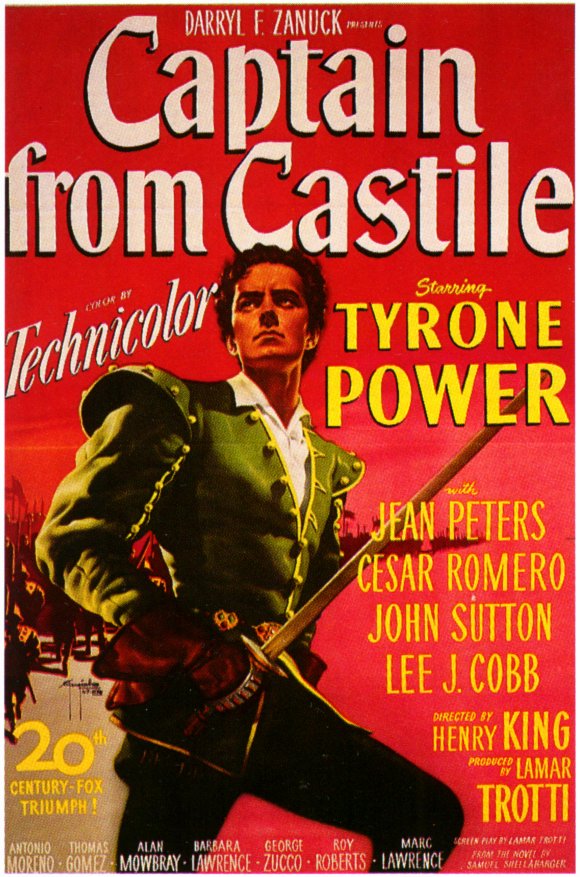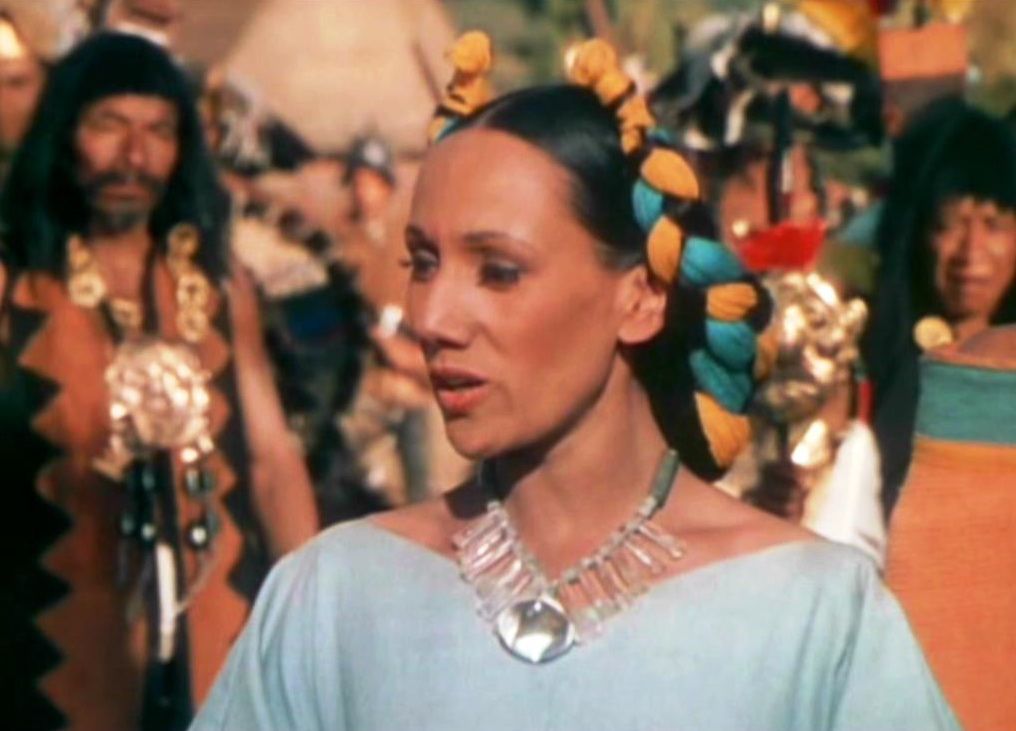Captain iuikpa castille*
Hollywood, with a few notable exceptions (Warner Brothers’ 1939 “Juarez”), has normally turned to cliches and romanticism when the setting is Mexico. Especially “Olde Mexico”. The 1947 “Captain From Castille” would have been just another Tryone Power swashbuckling adventure story… sword play and… being “olde Mexico”… an evil Inquisitor, a Señorita (Jean Peters) to be saved from a fate worth than death (and to be won by Tryone in the end) and … surprisingly.. an unusual bit of historial accuracy you wouldn’t expect… But only thanks to an uncredited actress in a key role.
Shellabarger’s novel, and the script based on the novel, is based on Bernal Diaz de Castilo’s Historia verdadera de la conquista de la Nueva España written by the Conquistador about 50 years after the Conquest, no doubt a bit … shall we say… enhanced …over the long intervening years, and Diaz’ own sense of self-importance, mixed in with a romance and … for a villian… an agent of the Inquisition, doing what cliche Inquisitors do best (at least popular culture inquistors, not the inquistors about whom recent historians have discovered were not at all what we imagine). But… Hollywood being Hollywood… when the legend becomes the story… film the legend. Accuracy be damned. While there was a few “hispanics” in the cast playing hispanic characters (Cesar Romero as Hernan Cortés), one of the few Mexicans playing the part of a Meixcan… Stella Inda as Doña Marina… la Malache… Malintzin… who wouldn’t even be listed in the creidts at the flim’s end (although the real Doña Marina probably deserves the credit… or blame… for the eventual success of the Conquest) is credited with giving the film an unusual veneer of historical accuracy.
From the time she was first cast, Inda fought for accuracy. The costume meant for Doña Marina was something more suitable to a far east swashbuckler than one set in 1520s Mexico. Aztec women certainly didn’t wear silky sarongs. And, looking over the script, Inda noticed something that her gringo employers boviously had never given a thought to. While, in an American film for American audiences, it was natural that the “Spaniards” spoke in English, it made no sense that the “Aztecs” spoke Spanish. Surprisingly, when Inda brought her concerns to director Henry King, he agreed to her suggested changes.
One wonders if King or Inda knew what they’d just let themselves in for. Inda drew up designs for a more authentic huipal for her Doña Marina to wear, but neither she, nor any of the actors with roles as “Aztecs” spoke authentic Nahautl. King hired anthopologist Daniel Rubín de la Borbolla to translate the lines spoken by “Indians” into Nahautl, and brought in the noted linguist R. H. Barlow to not just teach the actors their lines, but to stay on the set and… if they misprounced a word in Nahautl, to insure King would re-shoot the scene. Barlow was no mere academic, at various points in his life being the literary executor of horror writer H.P. Lovecraft and later a mentor to Beat novelist William S. Burroughs during his stint in Mexico.
Amazingly, Inda herself didn’t know a word of Nahautl when she made her suggestions, although she felt compelled to learn it. Nor did the Canadian actor playing an Aztec, Jay Silverheels, know Nahautl. Although, it has to be said, unlike his role as Tonto in the 1949-55 television series “The Lone Ranger”, at least the Mohawk actor for once got to speak a real indigenous language on screen.
Inda would have a long, but not distinguished career (including a role in the worst horror film ever made, “Curse of the Aztec Mummy”) in Mexican films, but never was in another Hollywood film. Still, it was thanks to her that at least one “Olde Mexico” film out of any number of Hollywood films, had an unsual degree of historial accuracy and was probably the only major release film with significant dialoge in an indigenous American language.
* I don’t speak Nahautl, but I know where to find an English-Nahuatl on-line translator!
Sources:
Paramo, Pedro, “El capitán de Castilla” Cuando Hollywood denunció al racismo mexicano, Praxis, 7 Ago 2021








As an intrepreter I find this very interesting, thanks Rich.
This is something I’ve always discovered about Mexico….. When you hear a tale about Mexico and you investigate it you discover another story. its like peeling layers off an onion.
Well this is interesting. I recently watched the Mexican film, “Fatal,” which is done via a series of interviews trying to piece together the elements of a 20-year old crime. One of the interviewees speaks an indigenous tongue, which was very interesting to hear. Our best guess was Mixteco, though that could be totally off..
Cheers,
Kim G
Roma Sur, Mexico City
Where there’s more than one Nahuatl street name.